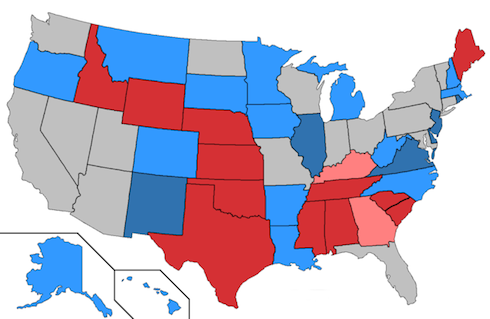It’s pretty well known that among Fox News’s “infotainment” programming (between its official news segments) the show Fox & Friends is perhaps the most devoid of a link to reality. But it does spit forth, within a vast mine of crap, some particularly putrid gems worth looking at in greater depth.
 One such recent gem was a segment with Allen West, a hyper-conservative former Congressman from Florida and advocate of the Tea Party movement, perhaps best known for his undying rage toward Muslims. (He is also known, among critics, for his borderline war crimes in Iraq that led to his early retirement from the U.S. Army — a fact the Fox News hosts did not bring up when repeatedly calling him “Colonel West.”)
One such recent gem was a segment with Allen West, a hyper-conservative former Congressman from Florida and advocate of the Tea Party movement, perhaps best known for his undying rage toward Muslims. (He is also known, among critics, for his borderline war crimes in Iraq that led to his early retirement from the U.S. Army — a fact the Fox News hosts did not bring up when repeatedly calling him “Colonel West.”)
During this segment, the show asserted (with little daylight between his claims and the hosts’ statements) that the Muslim Brotherhood is about to become a party on everyone’s voting ballots, right alongside Democratic and Republican candidates.
Now, there are many things wrong with that claim (besides the fact that it’s 100% made-up). It’s hard to know where to begin.
For one thing, the framing of the claim is outlandish because anyone could start any party (as many have indeed done) and it would still not be on the same level as the Democrats and Republicans — certainly no more than if I were to launch the “American Easter Bunny Supremacy Party” or whatever. But we’re talking about the network that tried to convince its viewers that the “New Black Panther Party” was a revolutionary force sweeping the nation and oppressing white voters, rather than two old Black men in berets looking cranky outside a single polling place in Philadelphia.
So, for today and the segment in question, it’s probably not worth my time to rehash the theme that Fox News is crafting an entirely fabricated reality that with each passing day shares fewer properties — nay, even laws of physics — with our dimension. If you want more on that, you’ll want to read my popular 2010 treatise entitled “The Right-Wing Alternate Universe.”
(Shout out, though, to their extensive world-building and long-running character development work on this Fox Newsiverse. They should host a con or have a wikia or something, so Fox News Channel nerds can discuss continuity error resolution and alternate timelines.)
Voting bloc
But the real reason I wanted to bring up this segment was the claim that a consortium or coalition of legitimate Muslim-American and Arab-American lobbying organizations were trying to put together a political party. That’s not actually true, as you’ll see from this quotation from the segment, where he elides two entirely different concepts of
1) a political party and
2) a voting bloc (a group of voters who informally vote together based on a shared interest).
From the Informed Comment summary of the exchange (if you haven’t watched the clip yet):
“They’re forming some type of political party, a voting bloc as they call it,” West said.
“In this country!” Doocy emphasized.
“That’s right! To institutionalize policies that favor them,” West agreed, adding that they wanted to “destroy America from within using a civilizational jihad, and that’s exactly what you see happening.”
Ok, so in reality (as he tacitly acknowledges without formally acknowledging) no one is actually forming any type of political party. A “voting bloc as they call it” is exactly what every major group of united voters is called in every democracy in the world, but he makes it sound like a concept so exotic and Middle Eastern it just walked out of One Thousand and One Arabian Nights holding hands with Scheherazade.
If all the labor unions in the United States endorse a candidate and organize to get their membership to back that candidate, they have formed a voting bloc, not a political party. They’re not suddenly now “The Labor Party.”
But look at that other remark he tosses in there. He says they (the Muslim/Arab-American interest groups) want “to institutionalize policies that favor them.”
That’s a fancy way of saying they want to pass laws that are in line with their goals (of reducing discrimination against Americans who are Arab and Muslim and of promoting better cultural understanding).
If you listen to the clip of Allen West talking, but then read closely the words coming out of his mouth, it’s the political equivalent of Andy Daly’s (very funny) “Jerry O’Hearn, veteran standup comic” character who just says banal and vacant statements in the expected cadence and rhythm so it sounds like he’s doing a routine, without having to make actual jokes (much like West says banal facts but makes them sound shocking).
Daly has said that he developed the character after he accidentally timed a joke wrong one time and audience members laughed automatically at the pause rather than at the punchline because they thought he had already said it.
Similarly, Allen West can just say normal stuff in a scary way — “a voting bloc as they call it” or “to institutionalize policies that favor them” — and suddenly it has great meaning.
But actually, for the tea party movement, as I’ve argued before, there is great (negative) meaning to the idea of (other!) people voting for candidates that will pass “policies that favor them.” Read more



